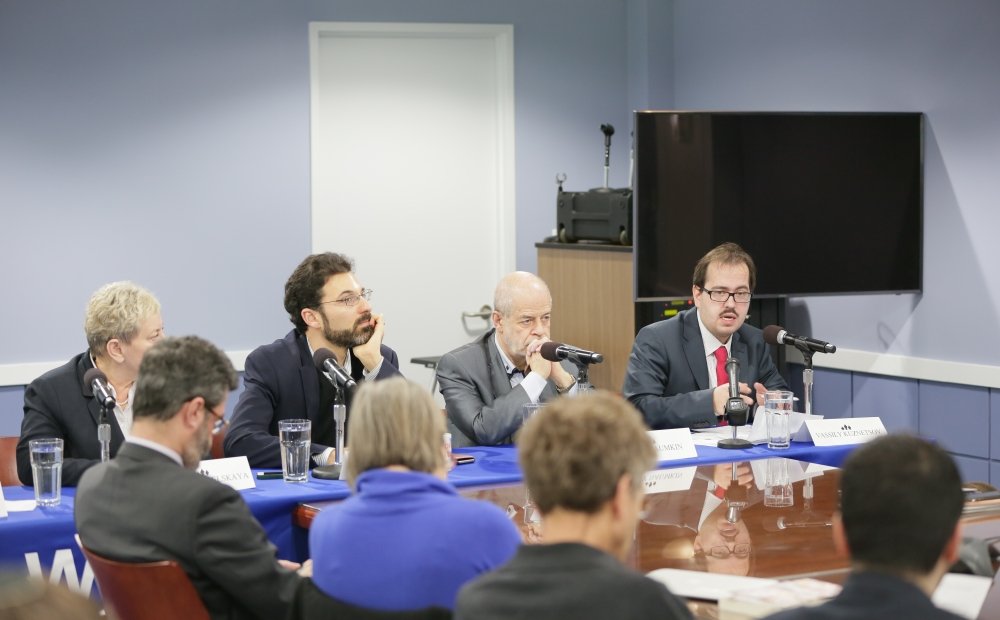US-Russian Cooperation in Syria

After a year that has seen increased turmoil in the Middle East, there is growing attention in the region from outside powers. A distinguished Russian delegation, led by Vitaliy Naumkin, presented their views on the geopolitical challenges in the region. In particular, they discusses Russia’s role in resolving the Syrian crisis, and outlined opportunities for collaboration with the United States.
Four experts offered their analysis on Russia’s position in resolving the Syrian crisis and identified opportunities for U.S. collaboration.
On January 27, 2016 the Kennan Institute and the Middle East Program at the Woodrow Wilson Center, hosted the event “US-Russian Cooperation in Syria,” with Vitaly V. Naumkin, Member of the Russian Academy of Sciences (RAS), President of the Institute of Oriental Studies, RAS, President of the Center for Strategic and Political Research, Head of Chair of the World Politics Faculty of the Moscow State University, and professor; Irina D. Zvyagelskaya, Chief Researcher for the Institute of Oriental Studies, RAS, Professor at the Moscow Institute of International Relations and the Institute of African and Asian Studies at Moscow State University; Vassily A. Kuznetsov, Head of the Center for Arab and Islamic Studies and the Institute of Oriental Studies at RAS and Head of the Centre for Political Systems and Cultures, World Politics Faculty at Moscow State University; and Henri J. Barkey, Director of the Middle East Program at the Woodrow Wilson Center. Matthew Rojansky, Director of the Kennan Institute at the Woodrow Wilson Center, moderated the event.
Naumkin began by emphasizing the difficulty of describing Russia’s relationship with Syria. He noted that Russia’s position is based on two tracks: the military track, in which Russia uses direct military involvement to assist Syria in confronting jihadism and extremism, and the political track, in which Russia focuses on efforts to establish reconciliation, citing that Moscow hosted intra-Syria talks in January and April 2015. Naumkin, Zvyagelskaya, and Kuznetsov all agreed the political track was the more important of the two. Though Russia is continuing efforts on the political front, Naumkin acknowledged the obstacles to negotiations. Among these are the difficulty in determining representation of opposition groups and working to improve broader representation of these groups. He went on to discuss the game changers in the region, such as the drop in oil prices and the tension between Russia and Turkey.
Zvyagelskaya agreed that Russia has the potential to assist in this crisis, and the primary focus should be to overcome tensions through the political track. She stressed Russia’s concern with preserving the last secular regime in the region. Although there is currently a continuation of military action, she said it will not suffice to end the conflict because without political settlement there is no room to find common ground on important issues in the Middle East. Zvyagelskaya expressed that this should be the most important issue for all international actors right now.
Kuznetsov stated that from Russia’s point of view, jihadism is the main threat, but there is still not a clear understanding of what terrorism is. He urged the audience to think about the ideological struggle within the jihadist movement. Presently there is a conflict between young and old jihadists, between regions, and between groups like al-Qaeda and ISIS. The escalation of these conflicts could be positive for Russia, Kuznetsov noted. He went on to stress that jihadism extends outside territorial identities, such as the case of al-Nusra and ISIS.
Barkey asked the panel what Russia thinks Syria’s future should be, beyond preserving the last secular regime. Naumkin responded that Russia has a clear vision of what Syria should look like; there should be no return to pre-war conditions, and it should be Syrians who determine who will be in charge of the regime. Naumkin affirmed his opposition to outside countries deciding how long Syrian President Bashar al-Assad should remain in power. Barkey closed the discussion by stating that if in 2011 we had predicted Syria would be in the hands of a jihadist organization like ISIS, no one would have believed it. He noted that although we do not know what is next, what is clear is that regional powers have not done nearly enough, and asserted that perhaps this is why the United States and Russia have come together to find a solution.
By Elena Scott-Kakures, Middle East Program
Speakers
Hosted By

Kennan Institute
The Kennan Institute is the premier US center for advanced research on Eurasia and the oldest and largest regional program at the Woodrow Wilson International Center for Scholars. The Kennan Institute is committed to improving American understanding of Russia, Ukraine, Central Asia, the South Caucasus, and the surrounding region though research and exchange. Read more


Middle East Program
The Wilson Center’s Middle East Program serves as a crucial resource for the policymaking community and beyond, providing analyses and research that helps inform US foreign policymaking, stimulates public debate, and expands knowledge about issues in the wider Middle East and North Africa (MENA) region. Read more
